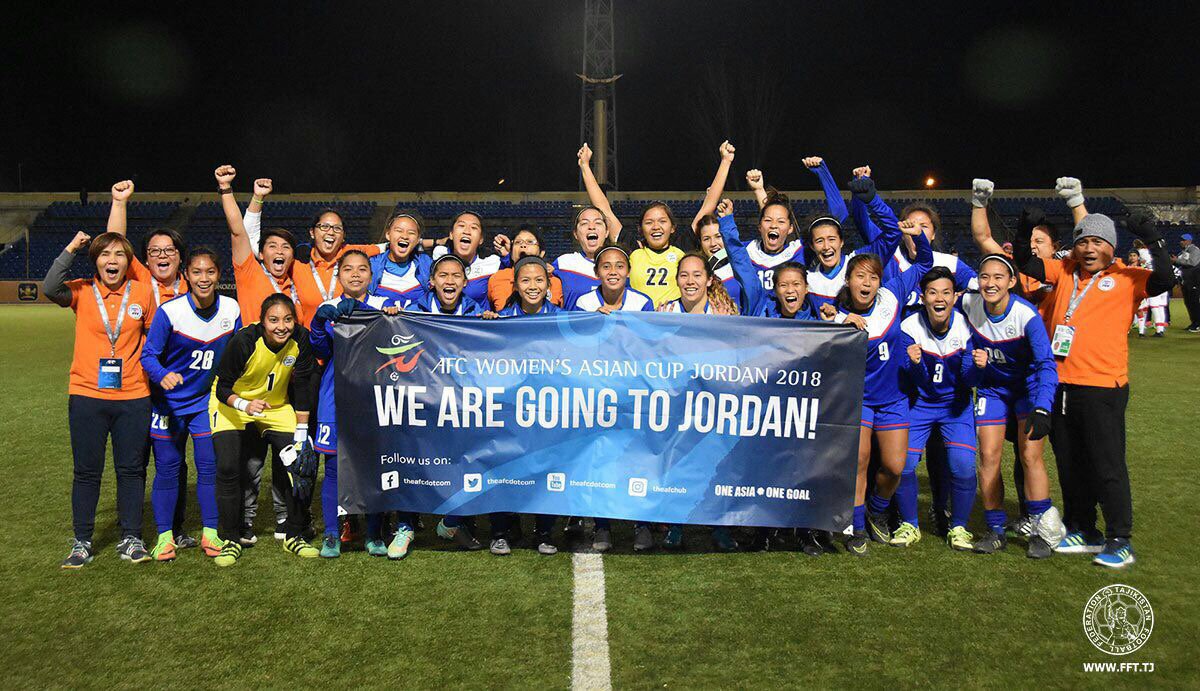Pinays on the front foot
For a very long time, women’s football in the country waited for its shining moment. A pair of runner-up finishes in age-group competitions organized by the Asian Football Confederation (AFC) in recent years hinted of bigger things to come.
Confined in the shadows of the Philippine Azkals, the women’s national team hardly created a ripple internationally, even struggling against teams in the Southeast Asian region.
All that changed close to two weeks ago when the plucky Filipinas made history by qualifying for the AFC Asian Cup 2018 in Jordan after finishing a battling second in their group in Dushanbe, Tajikistan.
The Filipinas left the country with little fanfare but they returned as the country’s newest sporting heroines, having made the prestigious continental competition for the first time despite the tough qualifying format. Only eight countries will vie for the Asian Cup crown next year, with the top five also clinching berths in the Women’s World Cup in France in 2019.
In Dushanbe, the Filipinas played with style and substance in rolling past their first three opponents—United Arab Emirates (4-0), Iraq (4-0) and Tajikistan (8-0)—to move on the verge of qualification. And, although they needed a late equalizer from Sara Castañeda in the 1-1 draw against Bahrain to secure the point they needed to clinch a berth in Jordan, pundits were raving at the way the women’s squad knocked the ball around with confidence and the quality of the goals.
READ: PH women’s football team qualifies for Asian Cup
A 1-5 drubbing to Jordan that closed out the campaign gave the Filipinas a reality check on the level they have to reach in the Asian Cup. But qualification is already a huge payoff as it was achieved with a team made up mostly of quality homegrown players.
What made the feat even more impressive was the fact that the preparation was far from ideal for coach Buda Bautista’s squad, which had players skipping training as they were in the middle of their UAAP campaigns.
“This team worked well together,” says captain Patrice Impelido. “We all made sacrifices to be here. We all knew it was possible and we all had the same mentality: We wanted to go to Jordan.”
Impelido can’t help but look back at the time when the team couldn’t even make up the numbers in training since most of the players were with their school teams. “I’m just proud of the team,” says the midfielder who, along with goalkeeper Inna Palacios, is the only holdover from the squad that failed to qualify in 2013.
“This journey is probably the hardest so far because of our commitments in the UAAP and school, as well as the injuries. Plus we didn’t have enough time to prepare,” says Palacios. “All the effort, time, double training, sleepless nights for school—the sacrifices we made were all worth it.”
Impelido says the team bonded well off the pitch, which translated to better cohesion in their play. “We just got along off the field well,” she says.
Philippine Football Federation general secretary Ed Gastanes describes the team as “young and fearless,” noting that the coaching staff made it a point to also bring young players to the tournament to gain experience.
But everything fell into place in those two weeks in Dushanbe.
Eva Madarang, the California-based striker, had little expectation of making the team. Starting out as leftback in the tryouts, she ended up playing striker and banged home four goals to share top-scorer honors with Hali Long. Madarang set up Castañeda for the all-important equalizer against Bahrain.
The homegrown players also made their presence felt with Irish Navaja, a La Salle standout, excelling on the left flank. Castañeda’s younger sister, Anicka, also a La Salle player, had her share of the limelight with a couple of goals against Tajikistan. Far Eastern U standout Dai Dolino, who hails from San Carlos City, also scored against Iraq, apart from marshalling a solid backline. Mary Christine Duran and Alisha del Campo, a student at De La Salle-Zobel, also made significant contributions to the campaign.
With the homegrown players in midseason form thanks to the UAAP and the PFF Women’s League, Bautista was able to focus more on tactics.
For sure, the Asian Cup will be a step up in competition with the Filipinas facing host Jordan, Australia, China, Japan, South Korea, Thailand, and Vietnam. But qualification has done wonders to the team’s confidence.
“We’ve already proven that anything is possible,” says Impelido.
And indeed they have—with amazing courage.

